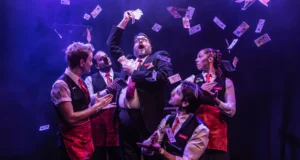Pros: The exposure of Sophocles to a wider, younger audience
Cons: The unresolved mix of ancient and modern By using its ancient model so closely and yet trying to be completely different from it, this adaptation tries to have its cake and eat it.
Summary
Rating
Good
What’s the point of Greek tragedy? Why put Antigone on here and now? Roy Williams’ update of the 2,500 year old Sophocles text answers that question admirably. Its heart is in the right place, but it is tangled in a mashup of ancient and modern that obscures what it’s trying to say to a contemporary audience.
We are no longer in ancient Thebes, but in an indeterminate urban, present-day setting. No longer in a royal palace, but in a night club. Eto and Orrin, brothers and rival gang leaders, have fought and killed each other. Creo, the new leader, demands that since Orrin was in the rival gang, his corpse should not be touched, and given no honour. Antigone, sister to the two brothers, defies Creo’s orders. It doesn’t end well. Already relying on a plot point that has very little resonance today (the importance of burial in the ancient world) Williams has weakened it even further. Instead of denying Orrin burial, Creo has ordered that no one can cover the body.
Names are changed to seem more contemporary. Tiresias is Tyrese and Antigone, as she defiantly insists, is just Tig. Even with these new names, the characters seem to lack a certain energy, with the exception of dotty pothead Tyrese the prophet, gasping on his oxygen tank and pushing his shopping trolley full of junk.
Williams’ adaptation delivers an odd mix of high register prose and street slang. Mark Monero’s Creo cannot seem to decide whether to enunciate clearly in crisp received pronunciation, or give over to glottal stops. Nor does the dialogue know whether to commit to tragedy or comedy. One of the guards is wisecracking every other line, and Creo tends to play for laughs, bringing a disturbing lightness to an otherwise grim play.
The language is updated but the values system is still unrelatable and the story slightly hard to fathom. It seems like Creo wants to kill Tig for no real reason, and the suicide pact at the end comes from nowhere. Still, the play has all the right intentions, pricking at the solemnity with which we tend to treat ancient texts. Moments of resonance for a modern audience are carefully plucked from the ancient text, such asthe importance of ‘fam’ and the corruptibility of those in power. This version is admirably appealing to younger and more diverse audiences than Greek tragedy usually receives.
Director Marcus Romer has added technological flourishes to bring the play into the 21st century. Dead Antigone appears at the beginning and end in the form of projections onto the pillars; the omniscient ancient gods are embodied in all-seeing CCTV cameras. Not only is there the persistent drone of music throughout each scene, transitions are accompanied by heavy, driving beats.
Joanna Scotcher’s design and the contemporary costumes work well together. The stage is a grey urban environment with metal gates and concrete pillars like a prison. Creo’s throne is a blue velvet seat carved out of a dumpster. The lighting by Alexandra Stafford – or rather the use of darkness infected with little splashes of neon colour to enhance this murky city setting – complements the design perfectly.
It’s a jumble of ancient and modern sensibilities, a clash of the remote and the contemporary. In an attempt to speak to a modern audience, this Antigone just twists itself into something even more unfathomable.
Writer: Sophocles
Adapted by: Roy Williams
Director: Marcus Romer
Producer: Pilot Theatre
Booking until: 14 March 2015
Booking link: http://www.stratfordeast.com/antigone
Box office: 020 8534 0310
 Everything Theatre Reviews, interviews and news for theatre lovers, London and beyond
Everything Theatre Reviews, interviews and news for theatre lovers, London and beyond


